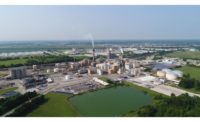Tate & Lyle PLC (Tate & Lyle), a global food and beverage ingredient supplier, is pleased to announce that it has exceeded its 2020 environmental targets, set using a 2008 baseline. Scope 1 and 2 greenhouse gas (GHG) emissions, generated by on-site energy use, were reduced by 25 percent (target of 19 percent), and waste to landfill was reduced by 37 percent (target of 30 percent). These environmental benefits are equivalent to the carbon captured by nearly 1 million acres of US forestry and 1,700 fewer garbage trucks taken to landfill.
The GHG emissions reduction target was delivered largely by investing in the transition to cleaner energy sources, such as replacing the coal boiler with a natural gas-fired combined heat and power system at the corn wet mill in Loudon, Tennessee (pictured). The waste target was met largely by eliminating certain waste streams from the production process by reclaiming organic solids which would otherwise have been sent to landfill.
In May 2020, Tate & Lyle set new ambitious environmental targets for 2030 for GHG emissions, waste, water and sustainable agriculture. The 2030 GHG emissions reduction targets have been validated as science-based by the Science Based Targets Initiative, meaning they are in line with the goals of the Paris Agreement in Climate Change.
Nick Hampton, chief executive at Tate & Lyle, said: “We are proud of the progress we have made against our environmental commitments over the last decade, and are now absolutely focused on delivering our new targets for 2030. Every part of our global team, from production to procurement, supply chain to sales, are playing their part to deliver our purpose of Improving Lives for Generations by caring for our planet and helping to tackle the world’s biggest shared challenge of climate change.
Sara Leeman, global environmental leader at Tate & Lyle, said: “In setting our 2030 environmental commitments, we broadened our scope to include water reduction, the beneficial use of all our waste, emissions resulting from our value chain (Scope 3), and support for sustainable agriculture. Our new targets mean we are really challenging ourselves to make real and lasting improvements to the environment around us, while also continuing to grow our business.”





